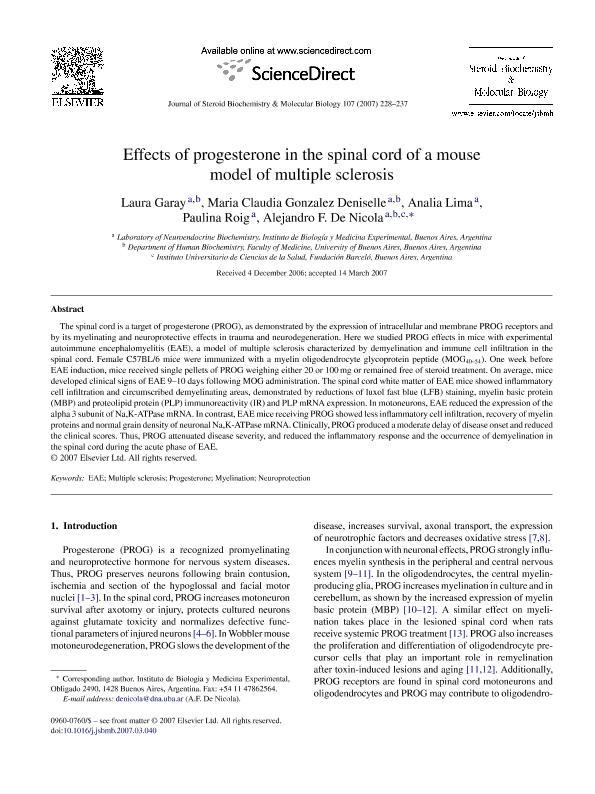Artículo
Effects of progesterone in the spinal cord of a mouse model of multiple sclerosis
Garay, Laura Ines ; Gonzalez Deniselle, Maria Claudia
; Gonzalez Deniselle, Maria Claudia ; Lima, Analia Ethel
; Lima, Analia Ethel ; Roig, Paulina
; Roig, Paulina ; de Nicola, Alejandro Federico
; de Nicola, Alejandro Federico
 ; Gonzalez Deniselle, Maria Claudia
; Gonzalez Deniselle, Maria Claudia ; Lima, Analia Ethel
; Lima, Analia Ethel ; Roig, Paulina
; Roig, Paulina ; de Nicola, Alejandro Federico
; de Nicola, Alejandro Federico
Fecha de publicación:
12/2007
Editorial:
Elsevier
Revista:
Journal of Steroid Biochemistry and Molecular Biology
ISSN:
0960-0760
e-ISSN:
1879-1220
Idioma:
Inglés
Tipo de recurso:
Artículo publicado
Clasificación temática:
Resumen
The spinal cord is a target of progesterone (PROG), as demonstrated by the expression of intracellular and membrane PROG receptors and by its myelinating and neuroprotective effects in trauma and neurodegeneration. Here we studied PROG effects in mice with experimental autoimmune encephalomyelitis (EAE), a model of multiple sclerosis characterized by demyelination and immune cell infiltration in the spinal cord. Female C57BL/6 mice were immunized with a myelin oligodendrocyte glycoprotein peptide (MOG40?54). One week before<br />EAE induction, mice received single pellets of PROG weighing either 20 or 100 mg or remained free of steroid treatment. On average, mice developed clinical signs of EAE 9?10 days following MOG administration. The spinal cord white matter of EAE mice showed inflammatory cell infiltration and circumscribed demyelinating areas, demonstrated by reductions of luxol fast blue (LFB) staining, myelin basic protein (MBP) and proteolipid protein (PLP) immunoreactivity (IR) and PLP mRNA expression. In motoneurons, EAE reduced the expression of the alpha 3 subunit of Na,K-ATPase mRNA. In contrast, EAE mice receiving PROG showed less inflammatory cell infiltration, recovery of myelin proteins and normal grain density of neuronal Na,K-ATPasemRNA. Clinically, PROGproduced a moderate delay of disease onset and reduced the clinical scores. Thus, PROG attenuated disease severity, and reduced the inflammatory response and the occurrence of demyelination in the spinal cord during the acute phase of EAE.
Palabras clave:
Progesterone
,
Eae
,
Myelination
,
Myelin Basic Protein
,
Multiple Sclerosis
Archivos asociados
Licencia
Identificadores
Colecciones
Articulos(IBYME)
Articulos de INST.DE BIOLOGIA Y MEDICINA EXPERIMENTAL (I)
Articulos de INST.DE BIOLOGIA Y MEDICINA EXPERIMENTAL (I)
Citación
Garay, Laura Ines; Gonzalez Deniselle, Maria Claudia; Lima, Analia Ethel; Roig, Paulina; de Nicola, Alejandro Federico; Effects of progesterone in the spinal cord of a mouse model of multiple sclerosis; Elsevier; Journal of Steroid Biochemistry and Molecular Biology; 107; 3-5; 12-2007; 228-237
Compartir
Altmétricas



